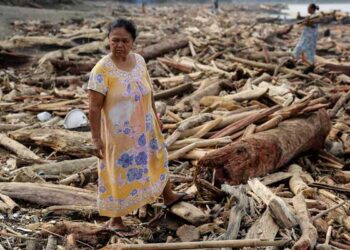Select Language:
- Over 50,000 individuals evacuated due to wildfires in Turkey and France.
- Fires are contained but not fully extinguished: officials.
- Extreme heat claims up to 480,000 lives globally each year.
On Monday, firefighters fought wildfires in Turkey and France, prompting the evacuation of over 50,000 people amid an early summer heat wave sweeping across Europe.
Health warnings were issued in France, Spain, Italy, Portugal, and Germany. Even the typically cooler Netherlands issued a heat warning for upcoming days, facing high temperatures and humidity.
“Much of Western Europe is enduring intense heat and conditions usually seen in July or August, not June,” stated Samantha Burgess, a climate strategist with the EU’s Copernicus Climate Change Service.
She noted that temperatures in some areas were 5-10 degrees Celsius (9-18 degrees Fahrenheit) above what is typical for this time of year.
In Turkey, wildfires continued to blaze in the western Izmir province for a second day, fueled by strong winds, according to Forestry Minister Ibrahim Yumakli. The Turkish emergency management authority, AFAD, reported that over 50,000 people had to leave five regions, with more than 42,000 evacuations occurring in Izmir alone.

Turkey’s coastal areas have faced devastating wildfires in recent years, as rising temperatures and drier summers are attributed to climate change driven by human activities.
In France, where a heat peak is anticipated on Tuesday and Wednesday, wildfires erupted on Sunday in the Aude department of southwestern France. With temperatures soaring above 40°C (104°F), the flames consumed 400 hectares, leading to the evacuation of a nearby campsite and abbey, officials reported.
Although the fires were under control, they had not been fully extinguished by Monday. France’s weather service, Meteo France, placed a record 84 out of 101 departments under an orange heat wave alert from Monday through midweek.
Western Europe Endures Heat
As spectators lined up at the All England Club for the Wimbledon tennis tournament and tourists explored the Colosseum in Rome, many felt the oppressive heat.
“It’s about 20 degrees warmer than I’m used to, and I’m completely sunburned,” said Scott Henderson, a tennis enthusiast visiting Wimbledon from Scotland.
Spain is on track for its hottest June ever, according to the national meteorological service AEMET.

“Intense heat will persist in much of Spain for at least a few more days, at least until Thursday,” stated Ruben del Campo, spokesperson for the weather agency.
Temperatures in Seville, where world leaders convened for a United Nations conference, reached 42°C (107.6°F).
“It’s unbearable,” remarked municipal worker Bernabe Rufo while cleaning a fountain. “We have to continuously seek shade.” The highest temperature recorded was 43.7°C (110.7°F) in El Granado.
In Italy, the health ministry issued heat warnings for 16 cities, including Rome and Milan. The Lombardy region, an industrial hub in northern Italy, is considering a ban on outdoor work during peak heat hours in response to trade union requests, according to its president.
Public Urged to Conserve Water
In Germany, heat alerts were also in effect across significant parts of the west and southwest, with temperatures reaching as high as 34°C (93°F). Authorities encouraged citizens to conserve water.

The ongoing heatwave has decreased water levels in the Rhine River, hindering shipping activities and driving up freight prices, according to cargo owners and commodity traders. German and French baseload power prices surged in response to increased cooling demand brought on by the heatwave.
Extreme heat can have various health implications, with experts particularly concerned for the elderly, infants, outdoor workers, and economically disadvantaged individuals.
Globally, extreme heat is responsible for approximately 480,000 deaths annually, exceeding the combined fatalities from floods, earthquakes, and hurricanes, posing escalating threats to infrastructure, the economy, and healthcare systems, as noted by Swiss Re earlier this month.
Experts attribute the primary cause of climate change to greenhouse gas emissions from burning fossil fuels. Last year marked the hottest on record for our planet.







